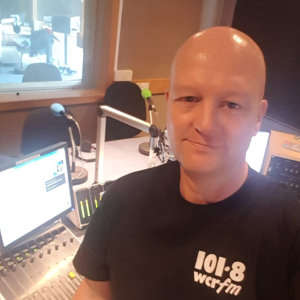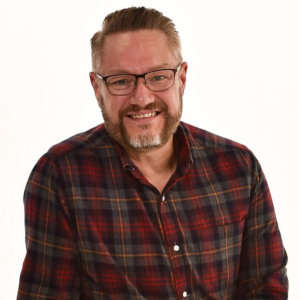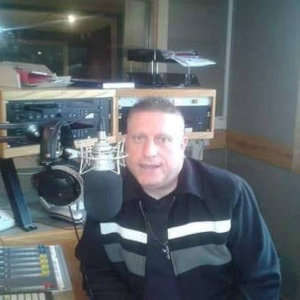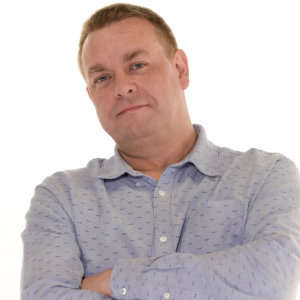More or Less: behind the statistics
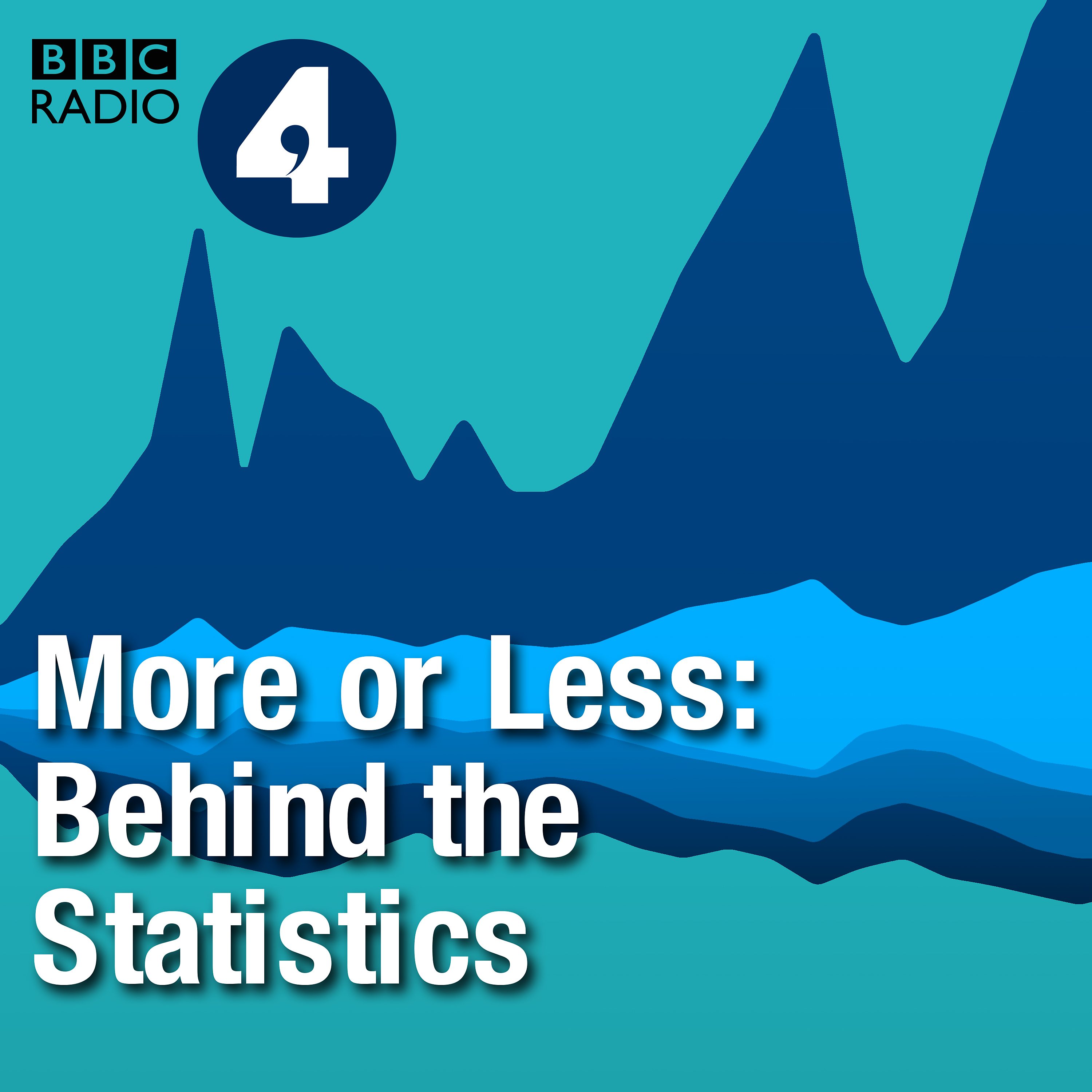
Tim Harford and the More or Less team try to make sense of the statistics which surround us. From BBC Radio 4
Subscribe to this podcast
Episodes
-
 The pioneers of proof
The pioneers of proof
Saturday, 19 April 2025
Here are More or Less we’ll all about the facts. Every day we use a toolkit of known proofs to try and answer our listeners’ questions. But who do we have to thank for this toolkit and how did they set about proving the unknown? Luckily for us mathematician Adam Kucharski has just written a book about this very topic called ‘Proof: The Uncertain Science of Certainty’. Join us to hear more about some of the proof pioneers included in his book, from estimating the number of German tanks during WW2 to an unsung heroine of statistics. Presenter: Tim Harford Producer: Lizzy McNeill Serie...
-
 How much is a human life worth?
How much is a human life worth?
Saturday, 12 April 2025
What is the cash value of a human life? That’s the question at the heart of The Price of Life, a book by journalist Jenny Kleeman. It turns out that there’s not just one price, there are many - depending on exactly how that life is being created, traded or destroyed. Tim Harford talks to Jenny about what she discovered. Presenter: Tim Harford Producer: Tom Colls Production co-ordinator: Brenda Brown Sound mix: Neil Churchill Editor: Richard Vadon
-
 Trump tariffs: All about the deficits
Trump tariffs: All about the deficits
Friday, 4 April 2025
US President Donald Trump has announced sweeping tariffs on global trade, adding taxes of as much as 50% to imports from some countries. The tariffs, he says, are “reciprocal” – calculated to address currency manipulation and trade barriers that other countries place on the US. However, when you look at how the new tariffs were actually calculated, that claim does not add up. Tim Harford speaks to Thomas Sampson, an associate professor at the London School of Economics, to understand what is going on.Presenter: Tim Harford Producers: Lizzy McNeill and Nathan Gower Series producer: Tom Coll...
-
 Is one in four people in the UK disabled?
Is one in four people in the UK disabled?
Wednesday, 2 April 2025
Donald Trump is raising tariffs on Canada, but has his northern neighbour done anything to deserve them?In her Spring Statement, Chancellor Rachel Reeves announced that the UK’s fiscal “headroom” was, again, £9.9bn. We explore this curious coincidence.Is it true that one in four people in the UK is disabled? And what does that mean for the state of our workforce?Tim Harford investigates some of the numbers in the news.Presenter: Tim Harford Reporter: Lizzy McNeill Producer: Nathan Gower Series producer: Tom Colls Production co-ordinator: Brenda Brown Sound mix: James Beard Editor: Richard V...
-
 What’s Trump’s problem with Canada?
What’s Trump’s problem with Canada?
Saturday, 29 March 2025
Neighbours, everybody needs good neighbours, and since the end of the Second World War that’s exactly what the US and Canada have been. They’ve enjoyed free trade agreements, close knit economic ties - and not so friendly ice hockey matches. But recently this relationship has soured, with President Trump calling them “one of the nastiest countries to deal with”. It looks like the era of mostly free trade is over, with a raft of tariffs set to come into force on April the 2nd, or “liberation day” a Donald Trump calls it. But is President Trump right about the trading relationship betwe...
-
 Could a 2% wealth tax raise £24bn?
Could a 2% wealth tax raise £24bn?
Wednesday, 26 March 2025
Some Labour politicians have been calling for a wealth tax, claiming a 2% tax could raise £24bn. Where are the numbers from and do they add up? A listener asked why housing in the UK is the oldest in Europe. We explain what’s going on. The Office for National Statistics has changed how it measures the value of pensions and knocked £2 trillion off its estimates of wealth. Not everyone thinks it was a good change. We find out why.And Lent is here, but how long is the Christian fasting period? We look at the history of a very flexible 40 days. Tim Harford investigates some of the numbers in th...
-
 What are the chances of an asteroid hitting earth in 2032?
What are the chances of an asteroid hitting earth in 2032?
Saturday, 22 March 2025
On 27 December 2024, astronomers spotted an asteroid that was potentially heading towards earth. Named 2024 YR4, it was estimated to be between 40m and 90m across, with the potential to cause massive damage if it hit a populated area of the planet.The chances of that happening, however, seemed to fluctuate significantly - ranging from 1% to a peak of 3%, before falling to virtually zero. Tim Harford investigates what was going on, with the help of Davide Farnocchia, a navigation engineer at NASA’s Jet Propulsion Laboratory.Presenter: Tim Harford Producer: Lizzy McNeill Series producer: T...
-
 Why are more people claiming disability benefits?
Why are more people claiming disability benefits?
Wednesday, 19 March 2025
More working age people are claiming disability benefits. What's driving the trend?Is it true that the UK imprisons more people for their social media posts than Russia does?One of the country’s most important data sources has been falling apart. We find out why.Tim Harford investigates some of the numbers in the news.Presenter: Tim Harford Reporter: Lizzy McNeill Producer: Nathan Gower Series producers: Charlotte McDonald and Tom Colls Production co-ordinator: Brenda Brown Sound mix: James Beard Editor: Richard Vadon
-
 How did lockdown impact children?
How did lockdown impact children?
Monday, 17 March 2025
In March 2020, the covid pandemic forced the UK into lockdown. Schools closed, universities went online and the economy shut down.It slowly became clear that young people were not falling victim to the virus in significant numbers - they made up a fraction of a percent of the overall death toll.But their lives were radically changed - most spending these formative ages stuck at home as the pandemic raged. Politicians and academics worried about the long term impact this would have on their chances in life.Five years on, Tim Harford delves into the data to try to work out what we can say wit...
-
 What is an IQ map and can we trust them?
What is an IQ map and can we trust them?
Saturday, 15 March 2025
You may have seen a map circulated on social media that claims to show the average IQ of different nations. If you look closely these numbers vary dramatically, with incredibly low scores in developing countries, including many in Africa. Unsurprisingly the map is often used as a way to bolster arguments about racial or national superiority. However, when you look at the data behind the claims the whole thing falls apart. We dive into the methods behind the map and ask whether it’s even possible to accurately put a number on intelligence. Presenter: Charlotte McDonald Producer: Lizzy McN...
-
 DOGE, apples and irregular migrants
DOGE, apples and irregular migrants
Wednesday, 12 March 2025
It’s been 12 weeks since President Trump announced the formation of DOGE, the so-called department of Government efficiency. We fact-check various claims connected with the drive to route out inefficiency. Listeners asked us to investigate the claim that 1 in 12 Londoners is an illegal immigrant. We look into the claim that imported New Zealand apples have a smaller carbon footprint than British grown apples. Plus - did VAT on private schools really boost the rate of inflation, or was that just a media concoction?Presenter: Tim Harford Series Producer: Charlotte McDonald Producers: Lizzy Mc...
-
 Is there really $500bn of Rare Earths in Ukraine?
Is there really $500bn of Rare Earths in Ukraine?
Saturday, 8 March 2025
As part of the fast-moving argument over US military support to Ukraine, the US demanded $500bn worth of access to what was variously reported as Ukraine’s rare earths or rare metals or rare minerals. But is there that amount of minerals in the ground?Presenter: Tim Harford Producer and Editor: Richard Vadon Studio Manager: James Beard Production Co-ordinator: Brenda Brown
-
 Defence Spending, Rare Earths and Trunk Truths
Defence Spending, Rare Earths and Trunk Truths
Wednesday, 5 March 2025
Has the US really sent Ukraine $350 billion for its war effort? Is a $500billion cut of Ukraine’s rare earth minerals a good deal? How will the UK fund the governments ambitions to raise defence spending to 3%? But most important of all - how many muscles are in an elephant’s trunk?Presenter: Tim Harford Series Producer: Charlotte McDonald Reporter: Lizzy McNeill Producers: Nathan Gower and Josh McMinn Sound Mix: James Beard Editor: Richard Vadon Production Co-Ordinator: Brenda Brown
-
 Has the US really given Ukraine more aid than Europe?
Has the US really given Ukraine more aid than Europe?
Saturday, 1 March 2025
As negotiations to end the Ukraine war rumble on, Donald Trump seems equally interested in talking about the past, repeatedly claiming that the US has given much more aid to Ukraine than Europe has, and that Europe’s aid took the form of a loan that they’ll be getting back. Emmanuel Macron has publicly contradicted the US President - so who’s correct? Nathan Gower speaks to Taro Nishikawa, project lead at the Kiel Institute’s Ukraine Support Tracker to get the true picture. Presenter / Producer: Nathan Gower Editor: Richard Vadon Sound Engineer: James Beard
-
 Are 150 year olds getting social security payments?
Are 150 year olds getting social security payments?
Saturday, 22 February 2025
Last week Elon Musk revealed that he had been through the Social Security Agencies database and found millions of people aged over 100. The vast majority of these people are dead, but their accounts and social security numbers remain live.Elon claimed that he had uncovered ‘the biggest fraud ever’ prompting some news outlets to speculate that billions of dollars might be being paid to these dead people every month. But is it true? We look at whether this is new information and what the data actually tells us. Produced and presented by: Lizzy McNeill Series producer: Tom Colls Editor: Ric...
-
 Has the US sent $50 million worth of condoms to Gaza?
Has the US sent $50 million worth of condoms to Gaza?
Saturday, 15 February 2025
On the 25th January, the US Press Secretary announced that in their bid to stop ‘fraud’ and waste DOGE had cancelled $50 million worth of condoms being sent to Gaza by the United States Agency for International Development (aka USAID). President Trump later repeated this claim, adding on that Hamas were using said condoms to make bombs to fire at Israel. On the 7th of February the USAID website was taken down. We fact check this claim and find out how much of the US budget was spent on USAID programmes. Presenter: Charlotte McDonald Producer: Lizzy McNeill Research: Josh McMinn Production C...
-
 Are black babies in the US really more likely to die under the care of white doctors?
Are black babies in the US really more likely to die under the care of white doctors?
Saturday, 8 February 2025
Babies born in the US to Black Hispanic or African American mothers are more likely to die than any other ethnic group in America. That is a fact. But the reason why this happens is unclear. In 2020 a study came out that claimed that black babies attended by white doctors after birth were twice as likely to die than white babies attended by white doctors. People jumped to the conclusion that the race of the doctor was leading to the different outcomes. But when you delve into the numbers, a very different picture starts to emerge.Presenter: Lizzy McNeill Series producer: Tom Colls Productio...
-
 Are quantum computers already super-powerful?
Are quantum computers already super-powerful?
Saturday, 1 February 2025
Google claim their latest quantum computer chip is able to process something in five minutes it would take a normal computer 10 septillion years to figure out.As this is a massive amount longer than the entire history of the known universe, that seems to suggest the chip is extremely powerful. But when you understand what’s going on, the claim doesn’t seem quite so impressive. Dr Peter Leek, a quantum computer scientist from Oxford University, explains the key context. Presenter: Charlotte McDonald Producer: Tom Colls Production co-ordinator: Brenda Brown Sound mix: Andrew Garratt Editor: R...
-
 Did Trump make billions with his meme-coin?
Did Trump make billions with his meme-coin?
Saturday, 25 January 2025
Just before being inaugurated as US president for the second time, Donald Trump launched something called a “meme-coin”. This is a bespoke cryptocurrency token featuring a picture of Donald Trump. A billion of them may eventually be created.Newspaper headlines claimed that the Trump meme-coin had made the president billions of dollars wealthier. But it is far from clear that this is the case. Presenter: Charlotte McDonald Producer: Lizzy McNeill Series producer: Tom Colls Production co-ordinator: Brenda Brown Sound mix: Mike Etherden Editor: Richard Vadon
-
 Can redheads handle 25% more pain than brunettes?
Can redheads handle 25% more pain than brunettes?
Saturday, 18 January 2025
What has the colour of your hair got to do with your capacity to withstand pain? We investigate the claim, which regularly circulates on social media, that natural redheads are 25% tougher than their brunette peers. Pain expert Jeff Mogil explains how it all comes down to something called MC1R. Presenter: Charlotte McDonald Producer: Lizzy McNeill Series Producer: Tom Colls Editor: Richard Vadon Production Co-ordinator: Katie Morrison
-
 Do 79% of Swedish asylum seekers go on holiday to the country they fled from?
Do 79% of Swedish asylum seekers go on holiday to the country they fled from?
Saturday, 11 January 2025
The claim that 79% of asylum seekers in Sweden go on holiday in their home country has been repeated regularly on social media. It’s used to argue that recent refugees are being disingenuous about the danger they face in the country they have fled from. But when you look at the survey the claim is based on, you see the stat in a very different way. We speak to Hjalmar Strid, who ran the survey for polling company Novus, and Tino Sanandaji from Bulletin, the online news site which published it.Presenter: Charlotte McDonald Producer: Tom Colls Production co-ordinator: Katie Morrison Sound ...
-
 Numbers of the year part 2
Numbers of the year part 2
Saturday, 4 January 2025
We asked and you responded, this edition of ‘numbers of the year’ are from you. our loyal listeners. We scoured the inboxes to find three fascinating numbers that say something about the world we live in now and put them to our experts. Tune if you want to hear about rising global temperatures, what Taylor Swift has in common with 65 years olds and facts about fax (machines). Contributors: Amanda Maycock, University of Leeds Jennifer Dowd, University of OxfordPresenter: Charlotte McDonald Reporter: Lizzy McNeill Producer: Vicky Baker and Lizzy McNeill Series Producer: Tom Colls Editor: Ric...
-
 Numbers of the year 2024
Numbers of the year 2024
Saturday, 28 December 2024
It’s that time of year again, the time when we ask some of our favourite statistically-inclined people for their numbers of the year. We present them to you - from falling birth rates in India to children saved by vaccines. Contributors: RukminiS, Data for India Professor Sir David Spiegelhalter, Cambridge University, Hannah Ritchie, Our World in Data. Presenter: Charlotte McDonald Producers: Lizzy McNeill and Vicky Baker Series Producer: Tom Colls Editor: Richard Vadon Sound Engineer: Donald McDonald and Rod Farquhar
-
 Did Mussolini make the trains run on time?
Did Mussolini make the trains run on time?
Saturday, 21 December 2024
“Say what you like about Mussolini but he did make the trains run on time.” This phrase is the political equivalent of “every cloud has a silver lining” – but does it have any factual basis? Mussolini’s dictatorship in Italy was full of atrocities, brutal suppression and propaganda. Did it also create a more efficient railway network? We speak to Professor Ruth Ben-Ghiat about the truth of the claim and why the Mussolini regime wanted us to believe it. Presenter: Lizzy McNeill Producer: Lizzy McNeill Researcher: Esme Winterbotham Series Producer: Tom Colls Editor: Richard Vadon ...
-
 How many Americans live ‘paycheck to paycheck’?
How many Americans live ‘paycheck to paycheck’?
Saturday, 14 December 2024
Are most Americans barely holding their head above water when it comes to personal finances? That’s what various US politicians and news outlets keep suggesting. They can’t stop using a statistic about people living “paycheck to paycheck”. But what does this really mean? We go behind the headlines to unpick the numbers. Contributor: Ben Krauss, journalist Presenter: Charlotte McDonald Producer: Vicky Baker and Lizzy McNeill Series Producer: Tom Colls Production co-ordinator: Katie Morrison Sound Engineer: Andrew Mills Editor: Richard Vadon
-
 Did one in 10 Greeks die in World War Two?
Did one in 10 Greeks die in World War Two?
Saturday, 7 December 2024
When World War Two came to Greece, a period of terrible human suffering followed. There was a brutal battle with Italian and then Nazi forces, followed by an occupation in which thousands were executed and a terrible famine swept the nation. There’s an often repeated number that appears to capture the brutality of this time – that 10% of the Greek population died during the war. We investigate where this statistic comes from and whether it is true. Presenter: Charlotte McDonald Producer: Tom Colls Production co-ordinator: Katie Morrison Sound mix: Neil Churchill Editor: Richard Vadon
-
 Can Elon Musk save the US Government $2 trillion?
Can Elon Musk save the US Government $2 trillion?
Saturday, 30 November 2024
President Elect Donald Trump has created a new government advisory group – the Department of Government Efficiency or ‘DOGE’ - to help cut the US budget. The world richest man, Elon Musk, will co-head the department and has pledged to cut ‘at least $2 trillion’ to ‘balance the budget’. But is this possible? We talk to Professor Linda Bilmes about what DOGE could or couldn’t do and how she balanced the budget in the 1990’s. Presenter: Charlotte McDonald Producer: Lizzy McNeill Series producer: Tom Colls Production co-ordinator: Katie Morrison Sound Mix: Andrew Mills Editor: Richard Vadon
-
 Do fossil fuels get $7 trillion in subsidies?
Do fossil fuels get $7 trillion in subsidies?
Saturday, 23 November 2024
Governments around the world have promised to fight climate change. But are they also pumping an absolutely massive amount of money into subsidies for fossil fuels? In 2022, an IMF working paper estimated that global subsidies for fossil fuels totalled $7 trillion. But when you dig into that research, you find that this number might not mean what you think it does. We explain how they reached that conclusion, with the help of Angela Picciariello from the International Institute for Sustainable Development, and Nate Vernon, one of the co-authors of the IMF paper.
-
 Did 20 million votes really go missing in the US election?
Did 20 million votes really go missing in the US election?
Saturday, 16 November 2024
Just hours after Donald Trump claimed victory in the US presidential election, rumours started swirling that something was afoot. A graph went viral on social media that appeared to show there were 20 million more votes cast in 2020 than in the 2024 election. Where had these supposedly “missing” votes gone? Conspiracy theorists on both sides of the political spectrum began shouting claims of fraud. The answer, it turns out, is rather more straightforward. Presenter: Charlotte McDonald Producer: Lizzy McNeill Series producer: Tom Colls Production co-ordinator: Katie Morrison Sound...
-
 Do we have enough clothes for the next six generations?
Do we have enough clothes for the next six generations?
Saturday, 9 November 2024
A huge quantity of clothing is produced every year around the world. But is so much made that there are already enough tops, trousers, skirts and all the rest to clothe humanity for decades into the future? That’s a claim that has been percolating around the internet recently, that there are already enough clothes for the next six generations. Tim Harford and Beth Ashmead Latham explore the source of this claim and, with help from Sabina Lawreniuk from Nottingham University, find that the evidence behind it is far from persuasive.Presenter: Tim Harford and Bethan Ashmead Latham Producer: Be...
